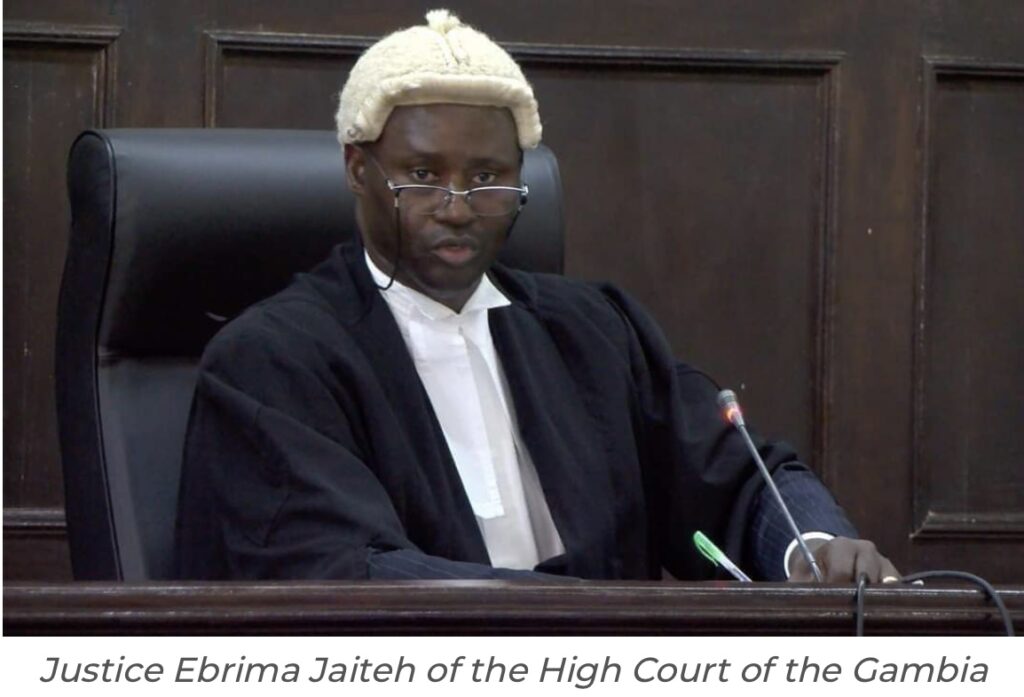
After spending nearly two years in detention, Alasan Tamba, a young Gambian man, has been acquitted and discharged by the High Court in Banjul following a wrongful accusation of robbery. The judgment was delivered by Justice Ebrima Jaiteh, who ruled that the prosecution failed to prove its case beyond a reasonable doubt.
Tamba had been standing trial on allegations of robbing one Modou Lamin Mansally of an iPhone XR valued at over GMD16,500, GMD4,800 in cash, and a Gambian passport, all reportedly contained in an Adidas bag. The alleged incident was said to have occurred on August 27, 2023, between 6:00 a.m. and 7:00 a.m. in Serrekunda.
The State formally charged Tamba on November 20, 2023, with a single count of robbery under Sections 272 and 273(1) of the Criminal Code. He pleaded not guilty on December 5, 2023, prompting the commencement of trial proceedings.
During the trial, the prosecution called two witnesses: Police Officer Kebba Lang Darboe and the complainant, Modou Lamin Mansally. Officer Darboe testified that Tamba was arrested near City Pub and Class One Bar by a police patrol team. He confirmed that Tamba was found empty-handed and that no stolen items were recovered during the arrest. A cautionary statement allegedly made by Tamba was admitted into evidence as Exhibit P1, though under cross-examination, the officer acknowledged it did not contain a confession.
Mansally, the complainant, told the court he was attacked by a group of five individuals while returning home. He claimed to recognize Tamba only after the attack, when the accused allegedly returned to the scene to retrieve his shoe. He admitted during cross-examination that he could not identify his attackers during the incident itself.
The prosecution opted not to call a third witness and closed its case on March 19, 2024.
In his defense, Tamba testified that he was on his way to work when an elderly man asked him to fetch a slipper near Bakau Garage. He denied any involvement in the robbery and stated he was later arrested while waiting for his workers. He disputed ownership of a phone number linked to the case and denied making any statement to the police.
A second defense witness, driver Kabir Wange, corroborated Tamba’s account, stating he received a call from Tamba on the morning of the incident requesting transport to work. Wange testified that he went to the location but did not see Tamba, though a bystander confirmed the accused had been there earlier.
Following oral arguments from both parties, Justice Jaiteh delivered a comprehensive ruling. He reiterated the fundamental principle of criminal law: the prosecution bears the burden of proving the guilt of the accused beyond a reasonable doubt. Citing Woolmington v DPP [1935] A.C. 462, the judge emphasized that a conviction cannot rest on the weaknesses of the defense.
Justice Jaiteh questioned the reliability of Mansally’s identification of the accused, noting that it was made only after the incident and not during the actual attack. He referred to the Gambian Court of Appeal case Mamadou Jallow v. Commissioner of Police [1960-1993] GLR 39, which underscores the need for identification evidence to be clear and unequivocal—qualities he found lacking in this case.
He further highlighted the absence of stolen property in Tamba’s possession, the lack of forensic or CCTV evidence, and the prosecution’s failure to present its third witness. Regarding Exhibit P1, the judge ruled it did not amount to a confession.
On the matter of the defense’s alibi, Justice Jaiteh acknowledged its lack of documentary support but stated that it sufficiently introduced reasonable doubt. He emphasized that the defense is not required to prove the alibi; rather, it is the prosecution’s obligation to rebut it effectively, which they failed to do.
Quoting Jua v State [2010] 2 MJSC 152, he warned against convicting individuals based on suspicion or inference, asserting that guilt must be established through compelling evidence.
Justice Jaiteh, in his concluding remarks, firmly stated: “In conclusion, the prosecution has not proved the essential elements of robbery as outlined in Section 272 of the Criminal Code. There is a conspicuous lack of direct evidence linking Alasan Tamba to the crime. The unreliable identification from PW2, coupled with the defence’s alibi that raises a reasonable doubt, affirms the inadequacy of the prosecution’s case. The accused’s denial, both in his testimony and cautionary statement, stands unchallenged by concrete evidence.”
Justice Jaiteh consequently acquitted and discharged Alasan Tamba and reminded the State of its right to appeal the judgment.

